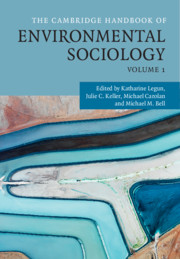Book contents
- The Cambridge Handbook of Environmental Sociology Volume 1
- The Cambridge Handbook of Environmental Sociology
- Copyright page
- Contents
- Figures
- Tables
- Contributors
- Foreword
- Introduction
- Part I Theory in Environmental Sociology
- 1 Classical Theory and Environmental Sociology: Toward Deeper and Stronger Roots
- 2 Globalizing Environmental Sociology
- 3 An Embodied Materialist Sociology
- 4 The Environmental Sociology of the Good: Nature, Faith, and the Bourgeois Transition
- 5 Microsociological Perspectives in Environmental Sociology
- Part II The Economy and Environmental Sociology
- Part III Culture and Environmental Sociology
- Part IV Politics, Power, State
- Part V Social Justice
- Index
- References
4 - The Environmental Sociology of the Good: Nature, Faith, and the Bourgeois Transition
from Part I - Theory in Environmental Sociology
Published online by Cambridge University Press: 05 November 2020
- The Cambridge Handbook of Environmental Sociology Volume 1
- The Cambridge Handbook of Environmental Sociology
- Copyright page
- Contents
- Figures
- Tables
- Contributors
- Foreword
- Introduction
- Part I Theory in Environmental Sociology
- 1 Classical Theory and Environmental Sociology: Toward Deeper and Stronger Roots
- 2 Globalizing Environmental Sociology
- 3 An Embodied Materialist Sociology
- 4 The Environmental Sociology of the Good: Nature, Faith, and the Bourgeois Transition
- 5 Microsociological Perspectives in Environmental Sociology
- Part II The Economy and Environmental Sociology
- Part III Culture and Environmental Sociology
- Part IV Politics, Power, State
- Part V Social Justice
- Index
- References
Summary
Environmental sociology strikes me as a deeply moral endeavor.I argue that understanding the good is not only relevant to the project of even having an environmental sociology.As well, there is an environmental sociology to the very idea of the good and its typical conception as being the non-political, removed from the human and therefore untainted and unpolluted by our desires and their corrupting hungers. The apartness with which we now typically regard both nature and the divine gives these realms innocence in our minds – which we then marshal in pursuit of our ambitions, yielding the common and deeply problematic paradox I call non-political politics.Such attempts at moral externalization characterize much of political debate in the present day, but has old roots. I show how the non-political idea of the good arose during bourgeois transition of the late Iron Age, and remains caught up in a social and economic conflict of long-standing and yet little notice: the pagan–bourgeois conflict and the ancient triangle of ideological separation between nature, the divine, and the human that this conflict birthed.
- Type
- Chapter
- Information
- The Cambridge Handbook of Environmental Sociology , pp. 64 - 73Publisher: Cambridge University PressPrint publication year: 2020

